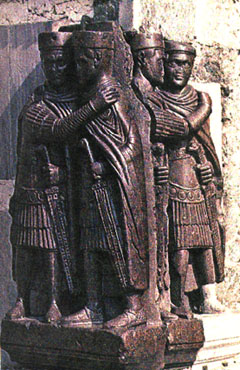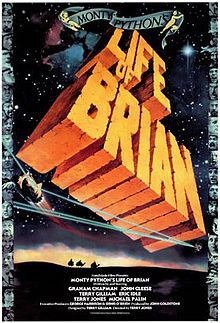
 |
Freethought & Rationalism ArchiveThe archives are read only. |
|
|||||||
|
|
Thread Tools | Search this Thread |
|
|
#161 | ||
|
Contributor
Join Date: Mar 2006
Location: Falls Creek, Oz.
Posts: 11,192
|
Quote:
"Gnostic texts use parody and satire quite frequently ... making fun of traditional biblical beliefs"I see the stuff I quoted as making fun of events and people appearing in the new testament canon. The Gnostic material was presented in books bearing the names of apostles of gospels and acts, interspersed with letters and prayers, which made fun of the traditional authority of the books of the NT canon. They became very popular in the empire among the Greek speaking and reading citizens who may have questioned the divine grace of the corresponding canonical set of books. Sort of "light relief" to the events unfolding during the rule of Constantine. There is reason to think that Eusebius had the Gnostic gospels and acts in mind when he wrote: “… the sacred matters of inspired teaching were exposed to the most shameful ridicule in the very theaters of the unbelievers.”I think that it is also within reason to think that Constantine had these "Gnostic Gospels and Acts" in mind when he wrote the following about Arius of Alexandria in a letter c.333 CE:
Who was Leucius Charinus? Who was Lithargoel? |
||
|
|
|
|
#162 | ||
|
Veteran Member
Join Date: Jun 2010
Location: seattle, wa
Posts: 9,337
|
Quote:
Let's deal with each 'element of satire' as you see it - one by one - and let us determine whether it really is satire or just a series of stupid, unbelievable stories. |
||
|
|
|
|
#163 | ||||
|
Veteran Member
Join Date: Jan 2008
Location: Latin America
Posts: 4,066
|
Quote:
Still, if one shifts the focus of the Eusebian Fiction postulate from Constantine to Diocletian some interesting patterns emerge. The Emperor Diocletian shaped his empire in the form of a tetrarchy and in like matter the four canonical gospels soon emerged.  Not surprisingly, even within the gospel accounts, the form of government the Romans implemented in Israel was a tetrarchy. Note Luke 3:1 Quote:
|
||||
|
|
|
|
#164 | |||||||
|
Contributor
Join Date: Mar 2006
Location: Falls Creek, Oz.
Posts: 11,192
|
 Quote:
Political Satire Quote:
Religious satire Humor about Catholicism Quote:
Type: Early Arian Document (Urkunde) 34 (=AW III2 no. 27; CPG 2042) Date: 333 CE Source: Athanasius, Defense of the Nicene Definition 40 (TLG) Also found in Socrates, Church History 1.9.30 and Gelasius, Church History 3.19.1 Trans: Coleman-Norton, P.R., Roman State and Christian Church, London: Society for Promoting Christian Knowledge (SPCK) 1966, #67. Quote:
I introduce source material in the form of the above letter that most academics conjecture to be a genuine letter from Constantine making complaints to Arius about Arius's failure to adapt to Constantine's state religion, and calling him a "Gallow's Rogue". This source material is not impossible to consider, since many other academics have also commented on this letter. Quote:
In that case start with Monty Python's "Life of Brian". We might almost change its title to "The Gospel of Brian". My claims are that the "Gospel of Nicodemus" and the "Acts of Pilate" contained therein, and all the "Gnostic Acts" ever attributed to the pseudonymous author Leucius Charinus, were authored in the epoch following Constantine's publication of the NT "canon", as seditious and satirical Greek language parodies aimed at diminishing the authority of the canonical "stories". The General Weapon of Humor (against an oppressor) These are not necessarily examples of satire, but of humor directed against religion and/or the church. In the context of the years commencing 324/325 CE Constantine is portrayed as an oppressor with respect to the pre-existent temple based pagan religions and cultures of the Roman Empire.
This last one is important to remember. IMO this is why there is such "comedy" in the "Gnostic Acts and Gospels". Why does Peter fit a camel through the eye of a needle (twice)? Both apologetic christians and even mainstream scholars seeking tenure in modern church funded institutes find it difficult to apperceive jokes against the subjects of the christian religious ideology - against Jesus and/or the Apostles. By some, the "Gnostic Acts and Gospels" have been termed a "textual critic's nightmare". IMO scholars have not yet identified the depth and consistency of the signature of the anti-christian parody and satire and comedy that characterise the entire body of the "Gnostic Acts and Gospels, etc". The failure to identify this has been because everyone has been induced to "believe in" an early chronology for the "Gnostic NT Books". The supermassive political and religious context of Nicaea is not being regarded because of an error in chronology, fabricated by the continuators of the orthodoc Nicaean state imperial church. The Gnostic authors as Post-Nicaean non Christian Alexandrian Greek academics IMO these authors were academic Alexandrian Greeks, and first hand witnesses to the fascist implementation in the Eastern empire of a "new and strange religion" of c.324/325 CE. They saw the fall of Alexandria to the "Christian army" of Constantine, and they were oppressed by the prohibition of their temple culture and traditional religious expression. An entire class of people had been made redundant - the pagan priesthood and its academies. And they reacted to the books of Constantine's new testament "quasi-canon" by authoring competing stories about the new god Jesus and his intrepid band of apostles. The Gnostic Books How did these Gnostic authors conduct their business? What was their modus operandi of construction of their stories? See Constantine's letter above, and compare this to the summary of academics at post # #156 The gnostic authors are mimicking the stories found in the NT canon. They are cutting and pasting bits from here and there, recombining various combinations and permutations, [artificers, writing with pens distilling poison [satire and parody], adding things further to orthodox doctrines, accurately elaborated, substituting a foreign hypostasis and paving the way for the marks of addition, ....... evil songs of unbelief] in the divine authority of the books of the NT canon. |
|||||||
|
|
|
|
#165 | |||
|
Contributor
Join Date: Mar 2006
Location: Falls Creek, Oz.
Posts: 11,192
|
Quote:
It is usual for a rising political figure to slander and/or calumnify the memory of the old regime and its leaders. Constantine's first action as Emperor of Rome was to search for Maxentius's head in the Tiber River and affix it to pike to be carried around te streets of Rome and thence to Africa "as a sterm warning that a new Pontifex Maximus had set up business. Diocletian's political and religious persecutions of the Manichaeans was also a political memory that was very fresh in the minds of the citizens of the Roman Empire. Diocletian was a great sponsor of the Graeco-Roman healing god Asclepius, whom Eusebius calumifies along with Apollonius of Tyana. Constantine targets the temples of the "Snake" for destruction c.324/325 CE prior to the religious harmony of Nicaea. Here is what Gibbon writes about Diocletian's palace: Quote:
Inflation and the Fall of the Roman Empire - Mises Daily: Monday, September 07, 2009 by Joseph R. Peden ---- This is an extremely interesting analysis covering Diocletian and Constantine and the emperor's constant need for gold to pay the army between the 1st and the 4th centuries. It suggests that Constantine inherited "Domesday books" prepared in the rule of Diocletian for the purposes of assessing taxation liabilities. But all of this just sets the political context of Nicaea. The OP here is about the noncanonical gospels. In the "Acts of Pilate" the author has Pilate tell the Jews that Jesus heals by the power of Asclepius. The author in the context of Nicaea, is spreading seditious rumors about Jesus. |
|||
|
|
|
|
#166 | |||
|
Contributor
Join Date: Jun 2000
Location: Los Angeles area
Posts: 40,549
|
Quote:
Quote:
|
|||
|
|
|
|
#167 | ||
|
Veteran Member
Join Date: Jul 2008
Location: Location: eastern North America
Posts: 1,468
|
Quote:
Isn't a "pagan", or "heathen", anyone who is not in accord with the interpretation of the canon, administered by some religious authority, pope or head of the Mormon church, or Reverend Moon, or whoever. Isn't this notion derived from Judaism? My idea of gnosticism (probably wrong) is that it represents a new millennium, Greek method of skeptical thinking, based upon rational, empiricist investigation. It seems completely heretical, to my childish notion of Christianity, for someone to be both Gnostic, and Christian. So, I would benefit from a link, if you have one, to explain what a "gnostic christian" may be? How would such a person NOT be ridiculed and condemned by "Irenaeus" and Eusebius? Quote:
With regard to your main point, whether or not the texts under discussion could have been written before Constantine, how would one resolve such a question? It seems to me, that we have no evidence for or against such a proposition. avi |
||
|
|
|
|
#168 | ||||||
|
Contributor
Join Date: Jun 2000
Location: Los Angeles area
Posts: 40,549
|
Quote:
The big arguments of this period are not between pagans and Christians, but among those who consider themselves Christians. Quote:
The current trend in scholarship is to see the term "Gnostic" as not very useful. But those who use the term intend it to refer to a search for inner knowledge, based on one's own authority. Quote:
Or read Freke and Gandy's Jesus Mysteries (or via: amazon.co.uk) (available on scribd). Skip over the parts about Horus or pagan parallels. Quote:
Orthodox just means "right thinking" or "correct dogma." Quote:
|
||||||
|
|
|
|
#169 | |||
|
Veteran Member
Join Date: Jul 2004
Location: Dancing
Posts: 9,940
|
Quote:
|
|||
|
|
|
|
#170 | |
|
Veteran Member
Join Date: Jul 2008
Location: Location: eastern North America
Posts: 1,468
|
Quote:
Cicero versus Suetonius; Grimmelshausen versus Goethe; Pascal versus Voltaire; Marlowe versus Swift; 150 years can be a fairly long interval, in terms of literary output. Can one not distinguish, in Greek texts, like those of Eusebius and Justin Martyr, a difference in writing style, (or, alternatively, a similarity in style!) of magnitude sufficient to warrant a conclusion one way or the other? avi |
|
|
|
| Thread Tools | Search this Thread |
|